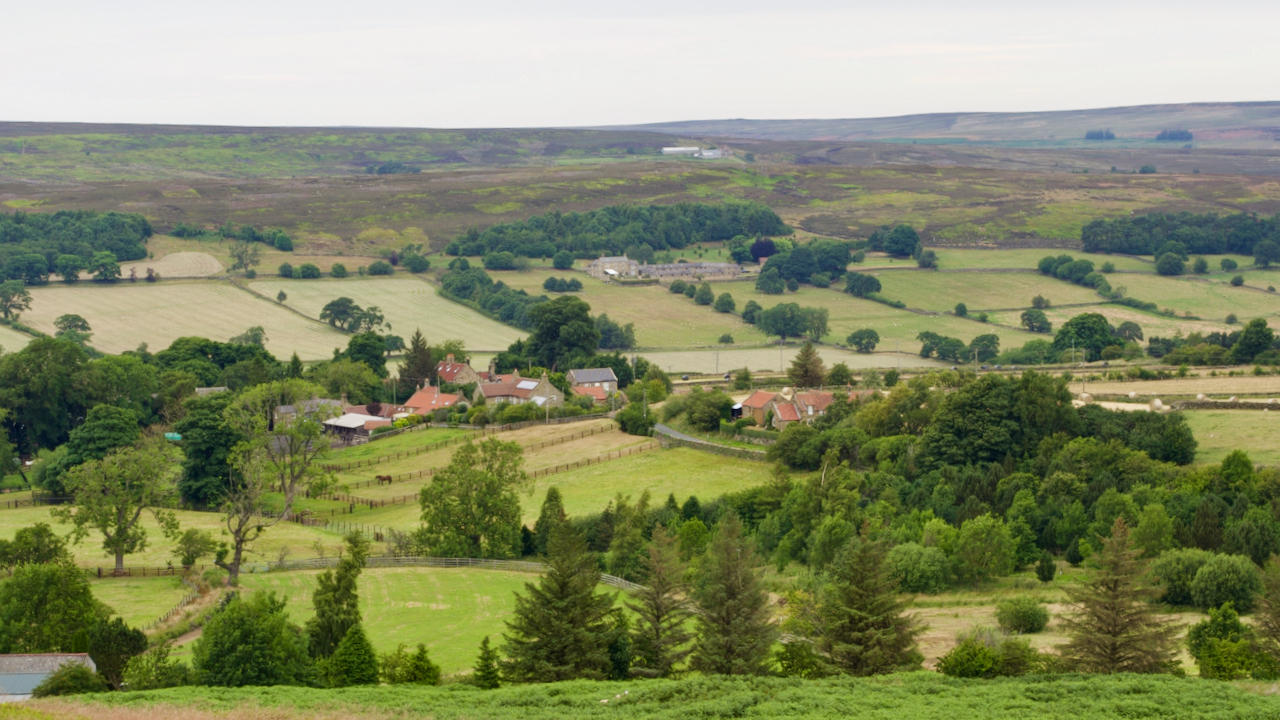So the Whitby gazette wrote in 1911, borrowing heavily from Lord Bryon’s poem about the battle at Marathon1Westerdale Church Re-opening | Whitby Gazette | Friday 04 August 1911 | British Newspaper Archive. Available online at: https://www.britishnewspaperarchive.co.uk/viewer/bl/0001103/19110804/307/0012 [Accessed 12 Jul. 2022]..
Today it’s such a sleepy village, home to about a hundred and thirty retirees and professionals, with a handful of working farms.
Its location is not conducive as a base for walking, so most of us fly through heading for the delights of Rosedale and Hutton-le-Hole.
It wasn’t always so, old Ordnance Survey maps record a post office, blacksmiths, Methodist chapel, school, and a pub, the Duncombe Arms2Ordnance Survey Six-inch England and Wales, 1842-1952. Yorkshire 44 (includes: Danby; Glaisdale.) Available online at: https://maps.nls.uk/view/102344296#zoom=7&lat=9589&lon=3176&layers=BT [Accessed 12 Jul. 2022].3Ordnance Survey 25 inch England and Wales, 1841-1952. Yorkshire XLIV.1 (Westerdale). Available online at: https://maps.nls.uk/view/125626030#zoom=6&lat=8416&lon=10740&layers=BT [Accessed 12 Jul. 2022].. the first edition of the O.S. map, also names a Crown Inn but I think this was a renaming later in the century. The Duncombe Arms advertised itself as a “favourite resort of Tourists in the Summer Season. PICNIC PARTIES & SCHOOLS TREATS can be accommodated on reasonable terms“4“Duncombe Arms, In The Village Of Westerdale.” | Whitby Gazette | Saturday 29 August 1885 | British Newspaper Archive. Available online at: https://www.britishnewspaperarchive.co.uk/viewer/bl/0001103/18850829/024/0001 [Accessed 12 Jul. 2022]..
Like in other dales in the Esk Valley, cheesemaking was once a significant part of the village economy with cheeses taken to Castleton Fair in October. However, the formation of the Milk Marketing Board in the 1930s started a lingering death to the industry5Hartley, Marie and Joan Ingilby. “Life and Tradition on The Moorlands of North-East Yorkshire”. Page 42. J.M. Dent & Son. 1972. ISBN 1 870071 54 9..
But village life was not always idyllic and law abiding. I came across this little gem in a 1916 edition of the Whitby Gazette of no less a person than the vicar flouting the wartime lighting regulations6A Westerdale Lighting Case | Whitby Gazette | Friday 20 October 1916 | British Newspaper Archive. Available online at: https://www.britishnewspaperarchive.co.uk/viewer/bl/0001103/19161020/139/0005 [Accessed 12 Jul. 2022].:
A WESTERDALE LIGHTING CASE
The Rector of Westerdale (the Rev. James Hyndson) was charged before the Guisborough Bench, on Tuesday, with offence under the Lighting Regulations.
Sergeant Davies stated that at 9 p.m., the 27th ult., he observed bright lights shining from three of the windows of the vicarage at WesterdaJe. One light from the bathroom was unshaded, and he distinctly saw the head of a person in that room. He called at the house, and defendant refused to come out and see the lights. Witness alleged that whilst was at the door was called a liar, a cad, and a loafer.
In reply to Mr. A. E. Forbes, who appeared for the defendant, witness denied that had previously inspected the arrangements at the vicarage for shading the lights and expressed himself satisfied with them.
Special-Constable Welford, who was on duty with Sergeant Davies, said he certainly saw a light coming from the Vicarage windows. There was a lamp the windowsill of the bathroom, and the light could seen half away. Mr. Forbes admitted that with regard to bathroom there had been slight offence. A match was struck in the room someone who was searching for something. Otherwise, defendant had taken every precaution to see that the whole of the windows were properly shaded. The sergeant had previously his client that he was satisfied.
The defendant said there were twenty-seven windows in his house, and it had cost him £15 to comply with the regulations. He denied that the officer was called “a liar,” but admitted that he (witness) said it was “caddish thing to do.” He was sorry that it was a misapplication of the term. A fine of £2 was imposed.
There’s always someone that breaks the rules.
- 1Westerdale Church Re-opening | Whitby Gazette | Friday 04 August 1911 | British Newspaper Archive. Available online at: https://www.britishnewspaperarchive.co.uk/viewer/bl/0001103/19110804/307/0012 [Accessed 12 Jul. 2022].
- 2Ordnance Survey Six-inch England and Wales, 1842-1952. Yorkshire 44 (includes: Danby; Glaisdale.) Available online at: https://maps.nls.uk/view/102344296#zoom=7&lat=9589&lon=3176&layers=BT [Accessed 12 Jul. 2022].
- 3Ordnance Survey 25 inch England and Wales, 1841-1952. Yorkshire XLIV.1 (Westerdale). Available online at: https://maps.nls.uk/view/125626030#zoom=6&lat=8416&lon=10740&layers=BT [Accessed 12 Jul. 2022].
- 4“Duncombe Arms, In The Village Of Westerdale.” | Whitby Gazette | Saturday 29 August 1885 | British Newspaper Archive. Available online at: https://www.britishnewspaperarchive.co.uk/viewer/bl/0001103/18850829/024/0001 [Accessed 12 Jul. 2022].
- 5Hartley, Marie and Joan Ingilby. “Life and Tradition on The Moorlands of North-East Yorkshire”. Page 42. J.M. Dent & Son. 1972. ISBN 1 870071 54 9.
- 6A Westerdale Lighting Case | Whitby Gazette | Friday 20 October 1916 | British Newspaper Archive. Available online at: https://www.britishnewspaperarchive.co.uk/viewer/bl/0001103/19161020/139/0005 [Accessed 12 Jul. 2022].

Leave a Reply